| Lady Justice and the Vet
Lady Justice and the Vet
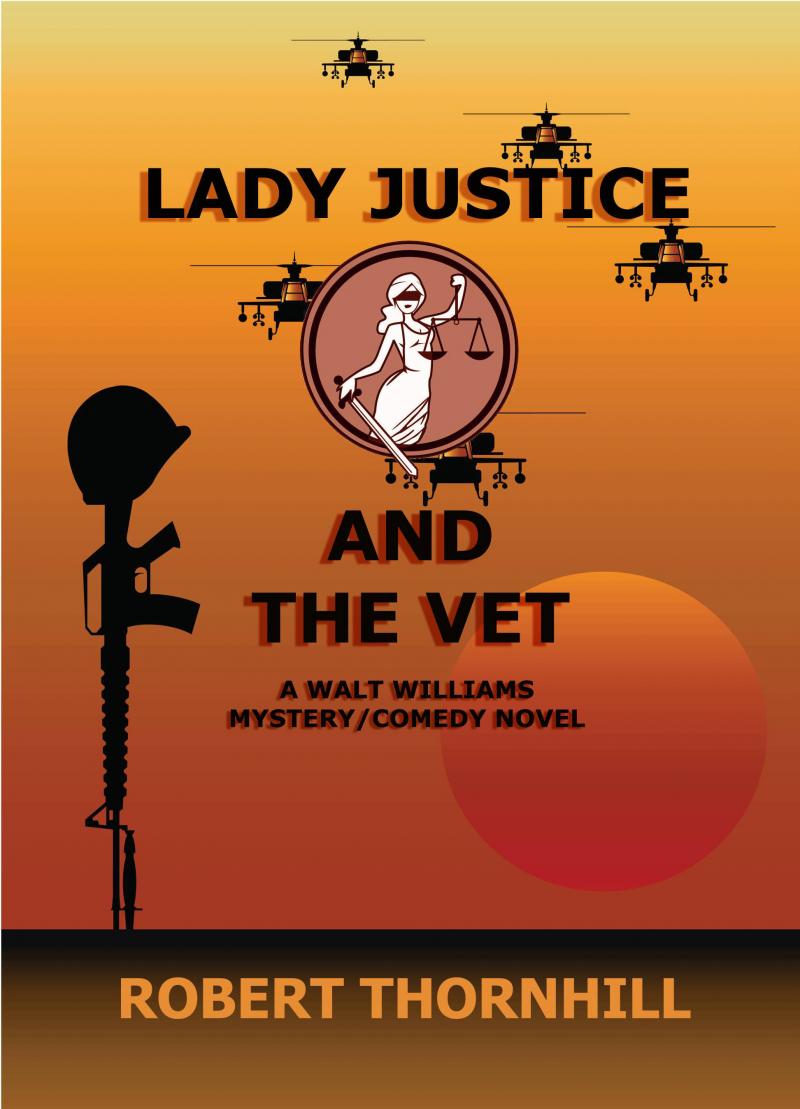
Men have been fighting and slaughtering one another since the beginning of time.
Brave men and women leave their homes, friends and families and travel thousands of miles to foreign lands to fight for liberty and justice.
Soon they find that the realities of war are far removed from the recruiter’s hype.
Many die on the field of battle; many more return home with wounds both physical and psychological.
For those that make the ultimate sacrifice, the war is over, but for those that survive, it is far from over.
Those who have served bravely and risked their lives deserve the opportunity to return to their homes, find jobs, have children and enjoy the life of freedom they fought for.
Too often, it just doesn’t happen.
Ben Singleton, a Marine veteran, had returned from a tour of duty in Afghanistan and was having difficulty adjusting to civilian life.
Fate, coincidence, or something else thrust him right into the heart of some of Walt and Ox’s most difficult cases.
Our heroes find themselves knee-deep in trouble as they go undercover in a nursing home to smoke out practitioners of Medicaid fraud, meanwhile, Islamic terrorists with ties to the Taliban are plotting to attack one of Kansas City’s most cherished institutions.
Join Walt and his band of senior sidekicks on another emotional roller coaster ride that will have you shedding tears of laughter one minute and sorrow the next.
Autographed Copy
$10.00 plus postage
LADY JUSTICE AND THE VET
PROLOGUE
Men have been fighting and slaughtering one another since the beginning of time.
Our great country was founded by the brave men and women that fought and gave their all in the Revolutionary War. It is estimated that 25,000 perished, but another 25,000 were wounded or disabled.
The Civil War proved to be the bloodiest in American history with over 620,000 deaths.
World War I saw over 116,000 die and World War II took the lives of over 405,000 service men and women.
Next came Korea where 36,500 US troops fell, followed by Vietnam where America suffered over 58,000 casualties.
Today, our fellow countrymen are fighting in Iraq and Afghanistan where 7,000 brave warriors have lost their lives.
In each of these conflicts, the agony, suffering and death of so many is justified because we are fighting to preserve our liberty and our freedom.
The last verse of our National Anthem says it all:
O thus be it ever, when free men shall stand
Between their loved home and the war’s desolation.
Blest with vict’ry and peace, may the Heav’n rescued land
Praise the Power that hath made and preserved us a nation.
Then conquer we must, when our cause it is just
And this be our motto, “In God is our trust.”
And the star spangled banner in triumph shall wave
O’er the land of the free and the home of the brave.
And so, with patriotism filling their hearts and high ideals filling their minds, our young men and women leave their homes, their friends and their families and travel thousands of miles to foreign lands to fight for liberty and justice.
Soon, they find that the reality of war is far removed from the recruiter’s encouragement to “Be all that you can be”, or to become one of “The few --- the proud --- the Marines.”
On the beaches of Normandy, in the jungles of Vietnam and on the barren plains of Afghanistan they soon discover, as did General William T. Sherman, that war is hell. “You cannot qualify war in harsher terms than I will. War is cruelty, and you cannot refine it.”
Many die on the field of battle; many more return home with wounds both physical and psychological.
For those that make the ultimate sacrifice, the war is over. These heroes are laid to rest with honor and their families say farewell, but for those that have survived, the war is far from over.
The popular conception of the returning soldier is the parade down Main Street with the high school band playing patriotic songs, and who hasn’t seen the famous photo of the returning sailor planting a big kiss on a total stranger in celebration of V-J day.
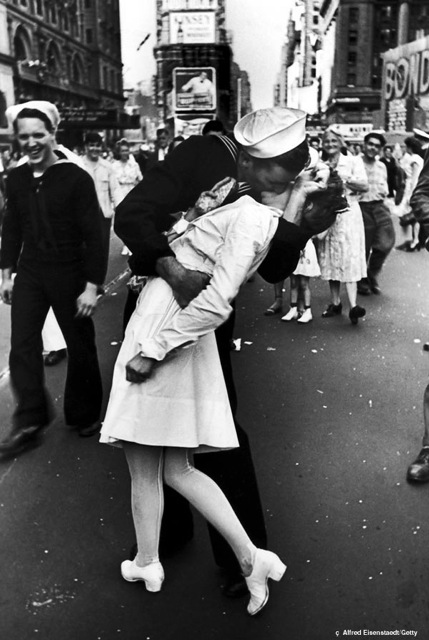
But for many, the reality is far different.
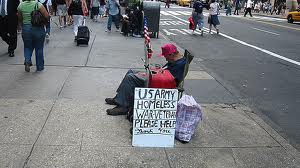
Long after the last shots are fired, the images of the battles, the suffering, the carnage and the cries of the wounded and dying are buried deep inside, and come back to haunt in the dark hours.
While many of the Americans that have fought in Iraq and Afghanistan have returned strengthened, with newfound confidence, deep friendships and pride of service, others have returned with mental scars, some diagnosed, some not.
It is estimated that nearly 20% of returning servicemen suffer from posttraumatic stress disorder.
Those who have served bravely and risked their lives to preserve our freedom deserve the opportunity to return to their homes, find jobs, have children and enjoy the life of freedom that they fought for.
Too often, it just doesn’t happen.
CHAPTER 1
Zad Valley, Helmand Province, Afghanistan
In the early morning hour, before the sun rose above the Tangee Mountains and cast its first rays into the Zad Valley, Sikorsky CH-53E Super Stallion helicopters swooped into the valley disgorging troops from the 3rd Battalion, 4th Marines. Their objective was to disrupt Taliban supply lines and communications.
Private First Class Archie Langston and Corporal Ben Singleton were among the thousand Marines that choked on the dust stirred up by the massive blades of the Stallions as they made their way across the valley toward the villages of the Helmand Province.
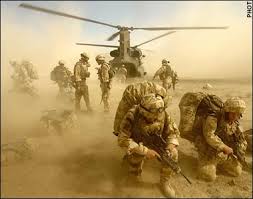
“Think we’ll see any ragheads today?” Langston asked as his company approached the mud walled compound surrounding the first village.
“Sergeant Clark said that forty or fifty Taliban had been spotted in the area,” Singleton replied. “So --- yeah, I think we’ll see some action today.”
“Quiet!” someone in front ordered.
As they moved silently through the pre-dawn darkness, they heard a low whistle just ahead --- followed by another whistle closer to the village --- then another.
“What is that?” Langston whispered.
“I think we just lost the element of surprise,” Singleton replied. “Lookouts from the village just announced our presence.”
As if in confirmation, a silhouette rose above the clay wall and a muzzle flash was followed by the report of an AK-47.
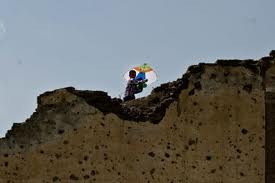
“Take cover!” Sergeant Clark ordered. “We’re sitting ducks out here in the dark. We’ll wait till first light to enter the village.”
As the darkness gave way to the dawn, the sergeant gave the order. “Let’s move out!”
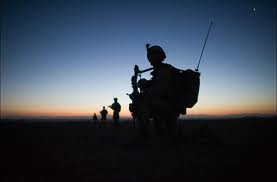
The company advanced cautiously toward the village, knowing that any moment Taliban soldiers might appear, attacking with their Ak-47’s and grenade launchers.
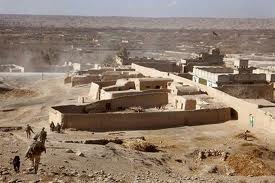
“Check every structure,” Sergeant Clark ordered. “They could be hiding anywhere.”
Quietly, the company moved through the village as ordered.
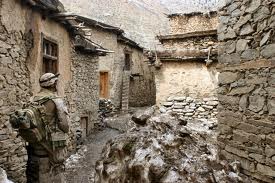
Most of the mud homes contained only frightened civilians, fearing both the Americans and the Taliban.
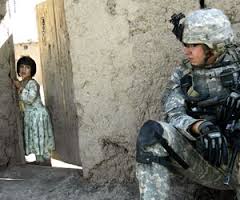
“Where are the bastards?” Private Langston asked as they entered the huge square that was the village market.
“They’re here somewhere,” Singleton replied. “We may not see them, but I’m betting they can see us.”
At that moment, a woman accompanied by a child approached the company from one of the shops in the market.
The sergeant held up his hand as the woman came near the advancing soldiers.

A moment later, the concussion from an explosion knocked Langston and Singleton to the ground.
“Oh my God! Langston shouted as he wiped bits of bone, blood and flesh from his face. “That woman --- she killed herself, her child and four of our guys! How can someone do that?”
Before Singleton could answer, a hail of bullets forced them to cover.
The firefight lasted only fifteen minutes, but in that time, three more of the company fell along with the Taliban snipers.
“Move out!” Sergeant Clark ordered, and the company moved forward checking every hut for the enemy.
When they reached the far end of the market square, another woman, draped in a heavy shawl, came running toward them.
“Suicide bomber!” someone yelled, and the woman fell as a half dozen soldiers fired.
There was no explosion and the men moved cautiously toward the still body.
Sergeant Clark pulled the shawl away expecting to see explosives strapped to her body. He grimaced and stepped back in horror as he saw the motionless body of a young child clinging to his mother’s breast in death.

“My God! What have we done?” he muttered.
The company watched in stunned silence as grieving family members carried the lifeless bodies away.
“I’m so sorry!” sobbed one of the soldiers that fired the fatal shots.
“Okay, pull yourselves together,” Sergeant Clark ordered. “We have a job to do. Let’s finish this and get out of here.”
Meticulously, they cleared the rest of the village and were on the road to their rendezvous point when Corporal Singleton heard the “click” from under the foot of a soldier a dozen yards ahead.
Dust, gravel and shrapnel filled the air as the IED exploded.
Corporal Singleton felt the stinging pain as the hot metal pierced his flesh.
Langston had been in front of him and had absorbed the bulk of the shrapnel.
Singleton crawled to the side of his fallen friend and was horrified to see bare bone protruding from where his legs had been.
“Corpsman! Corpsman! We need help here. Help! Somebody! Please!”
The last thing that he remembered before everything went dark was the “WHAP, WHAP, WHAP” of the blades of the big choppers that had come to carry away the wounded and dying.
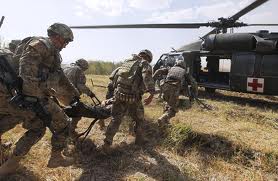
CHAPTER 2
“WHAP, WHAP, WHAP”
Ben Singleton heard the blades of the big choppers.
“Help! Over here! Archie’s hit! He’s hurt bad!”
“Shhh, Ben,” Tracy Singleton whispered, putting her arms around her husband. “It’s okay. I’m here. You’re home and safe.”
“The choppers,” he muttered. “I heard the choppers coming.”
“You were dreaming again, Sweetie. It’s just the ceiling fan.”
Ben lay very still and as he awoke from his recurring nightmare, he realized that she was right. He wasn’t in the dusty road outside the village in Zad Valley. He was safe and sound in his home in Kansas City.
“It’s just so real,” he whispered. “I could taste it, feel it, smell it --- I wonder if it will ever go away.”
“Dr. Fletcher said it would take some time ---”
“Time! How much time? It’s been four years!”
Immediately, he regretted his outburst. “I’m sorry Tracy. I didn’t mean to snap at you. You’ve been so great.”
“It’s okay. I understand,” she said laying her head on his chest. We’ll get through this --- together.”
Ben looked at the clock. “I’d better get going. We’ve got a big landscaping job in Brookside today.”
Before his tour in Afghanistan, Ben was being groomed for a management position in a large brokerage firm, but after returning home and healing from his wounds he discovered that he just wasn’t comfortable in the confines of an office. He felt enclosed and trapped.
After what he had seen and experienced in the Marines, his co-workers in their suits and ties seemed so shallow. Some had been curious about his tour of duty, but there was just no way that he could make someone that had not been there understand the horrors of battle.
He had taken a job with Empire Landscaping that gave him the freedom to work outside with minimal contact with the other members of the crew. It didn’t pay all that well, but it was hard physical labor which was what he needed to take his mind off of the images that kept forcing themselves back into his consciousness. Most nights, he would tumble into bed exhausted, and fall into a deep sleep --- most nights, but not all.
|